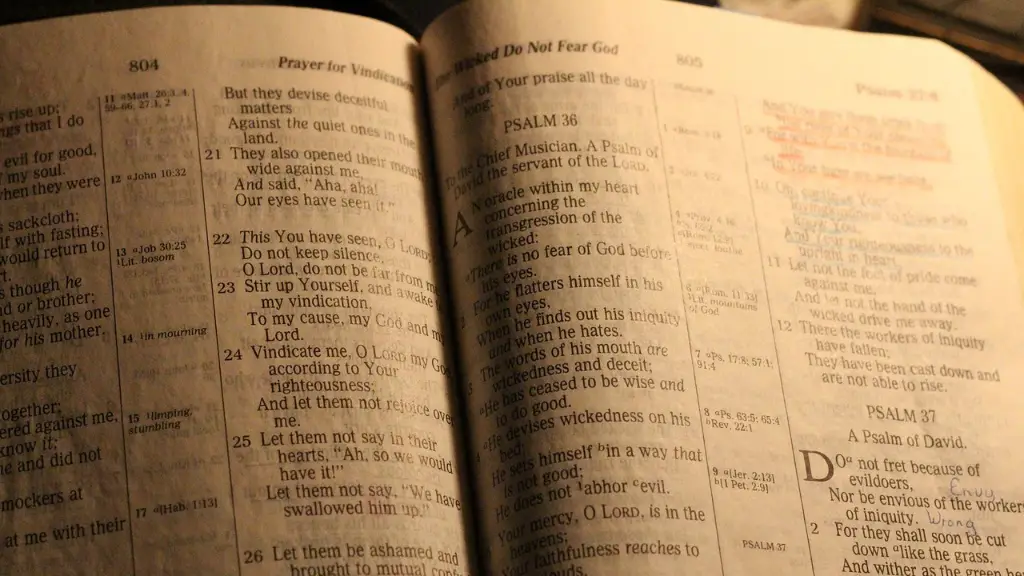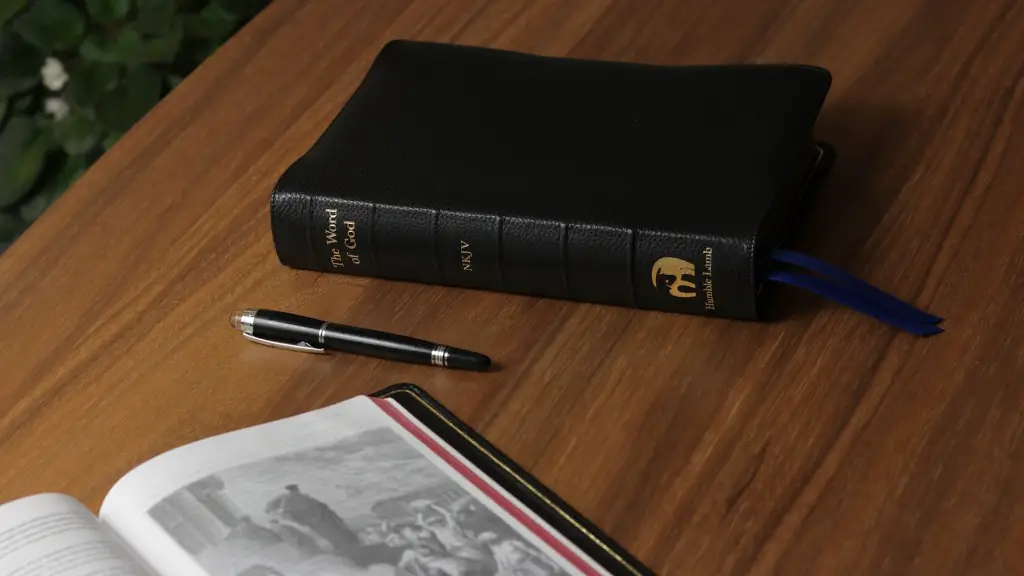The Bible is a mysterious book–also known as the “Good Book”–that has had a profound influence on human history. Its contents are made up of religious scriptures, stories and ancient wisdom. But how old is the Bible exactly? Some experts estimate the Bible to be more than 3,000 years old, suggesting it was first composed sometime before 1000 B.C.E.
Recently, a team of ancient manuscript specialists re-dated two fragments of the Bible and determined that they were both written much earlier than previously assumed. In a new study, these two fragments–the books of Leviticus and Deuteronomy–are thought to have been written as early as the 10th century B.C.E. This new dating indicates that the Bible is much older than previously assumed, possibly pre-dating the earliest known Bible fragments.
In addition to re-dating the Bible fragments, the team of experts used recently developed methods for analyzing the original language in which the Bible was written. This allowed them to determine that the Bible was composed in the ancient Hebrew language, predating the development of standard Classical Hebrew. This indicates that the Bible was written prior to the development of the standardized written language that evolved out of ancient Hebrew during the First Temple period in Jerusalem (1000-586 B.C.E).
The suggestion that the Bible is much older than once thought is a game-changer for biblical scholars. It provides new insights into how the ancient Israelites, who wrote and read the Bible, evolved over time and how the Bible was transmitted and preserved. It also raises questions about how the Bible was understood by the early Israelites and how it was used in their daily life.
Not all biblical scholars agree on the re-dating of the two pieces of the Bible. Some point out that since the evidence is so limited, it is impossible to make definitive conclusions about how old the Bible is. They maintain that further evidence needs to be uncovered in order to make an accurate assessment.
Still, the re-dating of the two ancient Bible fragments has set off an exciting new area of research into the history of the Bible and its importance in the formation of ancient Israelite culture and religion. With new techniques and technologies being developed all the time, it may be possible to uncover even more evidence of the Bible’s past and gain further insight into its impact on world history.
New Evidence
The study of the re-dated Bible fragments also highlights the importance of revisiting old evidence with new techniques and technologies. Recent advances in DNA analysis and radiocarbon dating have allowed researchers to re-examine old manuscripts and gain new insights into their history. This has been especially useful in the study of ancient manuscripts and other artifacts that were once thought to be too old and too fragile to be of any value.
By comparing the composition and structure of ancient texts to modern versions, researchers have been able to uncover clues about their origin and history. This has led to new scholarly insights into the Bible’s authorship, dating, and significance in ancient Israelite society. Researchers have also been able to uncover hidden meanings and symbols in the text that were previously unknown, providing new perspectives on how the Bible was heard and interpreted by the ancient Israelites.
In addition, archaeological evidence, such as pottery and other artifacts, has enabled researchers to piece together the history of the Bible and its influence on the development of the ancient Israelite society. This includes clues about how the Bible was used in religious ceremonies and rituals and the important role the Bible had in the formation of Israelite laws and customs.
By re-examining old evidence and applying new technologies, researchers have been able to gain new insights into the origins of the Bible and its impact on ancient Israelite society. These insights are helping to paint a clearer picture of the history of the Bible and its importance in shaping the world we know today.
Biblical Archaeology
The study of Biblical Archaeology has played an important role in uncovering the mysteries of the Bible’s past. By looking at ancient artifacts and examining the archaeological evidence of ancient sites, archaeologists have been able to uncover secrets about the history of the Bible and how it was used by the ancient Israelites.
Through archaeological investigations, researchers have been able to uncover evidence of the Israelites’ worship of Yahweh in the form of religious shrines, altars, and archaeological remains. These investigations have also provided evidence of the importance of the Bible in everyday life, such as evidence of its use in trade, rituals, and festivals.
In addition, archaeological evidence has also been used to gain new insights into the development of the Bible and its impact on the ancient world. This has allowed researchers to piece together the history of how the Bible was formed and how it was transmitted across different cultures and languages.
Biblical Archaeology has also shed light on the political and social changes that the Bible was used to legitimize. Archaeological evidence has shown how the Bible was used to support the claims of Israelite kings, legitimize their conquests, and unify the nation under religious law.
Through the use of archaeological evidence, scholars have also been able to gain further insight into the role that the Bible played in the formation of ancient Judaism and its role in the development of Christianity. By examining ancient sites, artifacts, and documents, researchers have been able to trace the spread of the Bible across time and place and uncover the many ways in which it shaped early societies.
New Technologies
Advances in technology have also made it possible to gain greater insight into the history of the Bible. Powerful computers and artificial intelligence have enabled scholars to quickly and accurately transcribe ancient texts and analyze their meaning.
This has allowed researchers to gain new insights into the Bible’s original language and better understand how it was written, read, and interpreted by the ancient Israelites. By using sophisticated algorithms and natural language processing, researchers can gain new insight into the Bible’s origins, translation, and interpretation.
In addition, technology has allowed scholars to use virtual reality and 3-D simulations to virtually travel back in time and explore ancient sites of biblical significance. This has enabled researchers to gain a better understanding of how the Bible was used in everyday life and how it was used to shape the beliefs, customs, and cultures of the ancient Israelites.
The use of new technologies has allowed researchers to study the Bible from a new perspective and gain greater insight into the history, significance, and impact of this ancient text.
Conclusion
Although the debate about the exact age of the Bible continues, there is now clear evidence that it is much older than previously assumed. By re-dating fragments and using new technologies, scholars have been able to shed new light on the history, authorship, and impact of the Bible.
Through the study of ancient manuscripts and archaeological evidence, researchers have been able to uncover the many ways the Bible was used to shape the religious, political, and social life of the ancient Israelites. In addition, advances in technology have made it possible to gain greater insight into the Bible’s original language and gain new perspectives on its meanings and interpretation.
The study of the Bible continues to reveal new mysteries and new insights into its profound influence on world culture and religion. As new evidence continues to be uncovered, scholars will undoubtedly make new discoveries that continue to expand our understanding of the Bible and its importance in the formation of ancient Israelite society.





